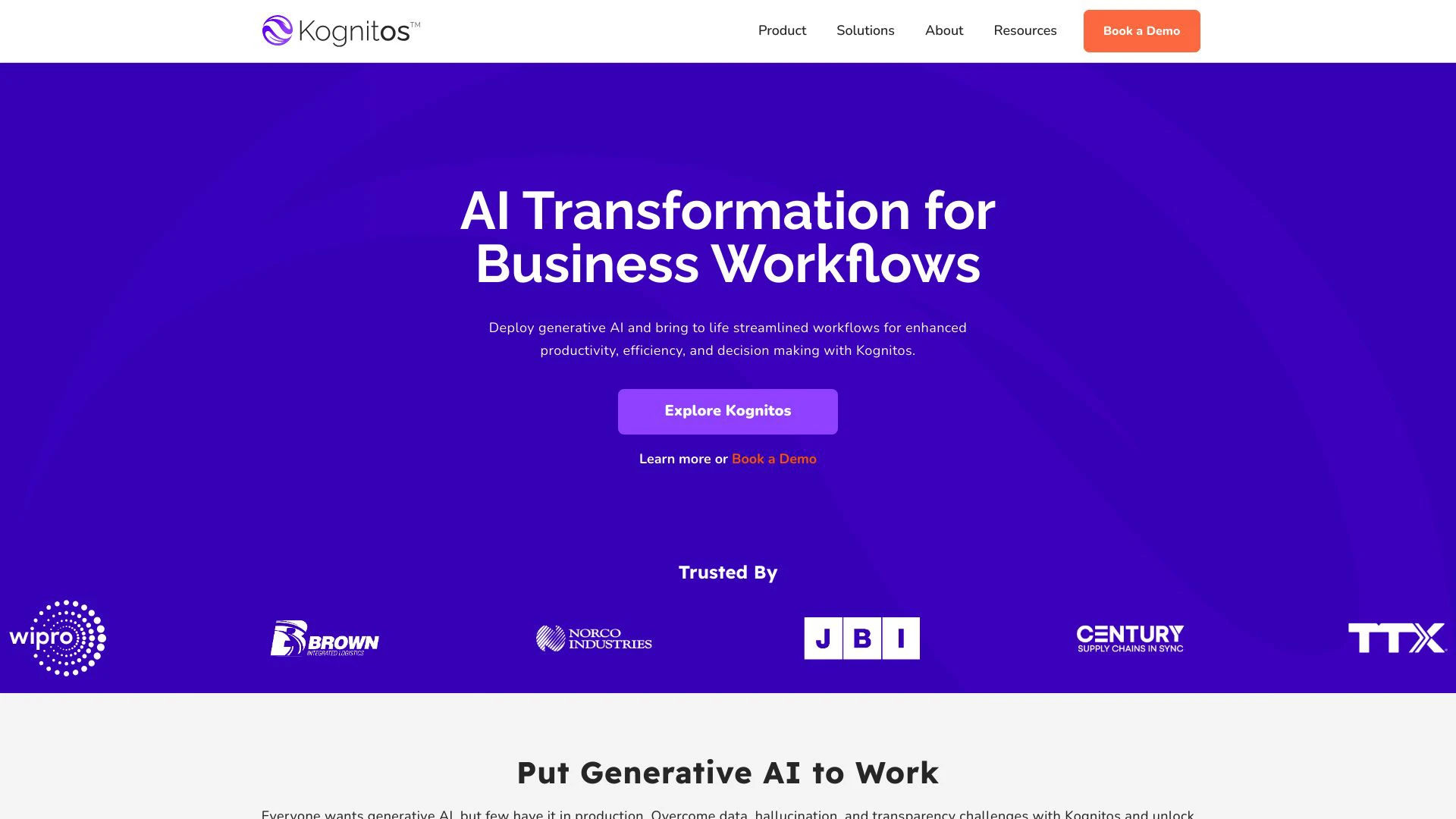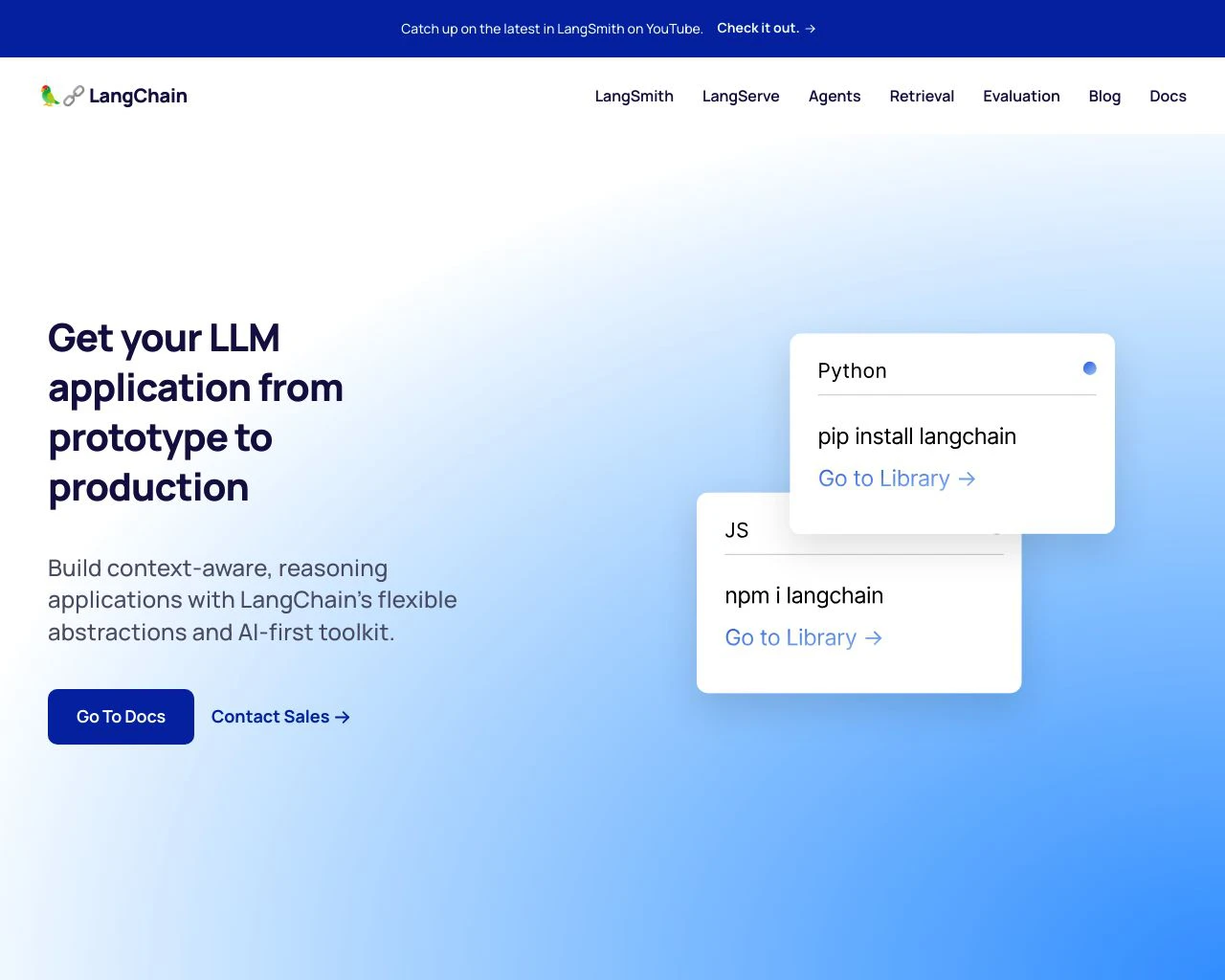Kognitos vs. LangChain: A Comprehensive Comparison of AI Automation Tools
AI automation and development tools reshape business processes and application creation. This comparison examines Kognitos vs. LangChain, and SmythOS — three platforms at the forefront of AI innovation. Kognitos empowers users with natural language automation, while LangChain offers developers a flexible framework for building AI applications.
SmythOS emerges as a comprehensive solution, blending user-friendly design with powerful capabilities. We evaluate each platform’s unique approach to AI integration, ease of use, and potential impact on various industries. By exploring their features, strengths, and limitations, readers gain insights to make informed decisions about implementing AI solutions in their organizations.
Kognitos Overview
Kognitos revolutionizes business process automation through its innovative use of natural language processing and AI. The platform empowers users to create sophisticated automations using plain English, eliminating the need for complex coding or traditional RPA bot management.
At its core, Kognitos leverages generative AI to interpret user instructions and execute tasks across various business applications. This approach makes automation accessible to a broader range of users, from developers to business analysts. The system’s ability to learn and adapt through natural dialogue sets it apart, allowing for continuous improvement and handling of exceptions without extensive reprogramming.
Kognitos revolutionizes business process automation through its innovative use of natural language processing and AI… eliminating the need for complex coding or traditional RPA bot management.


Kognitos excels in document processing, Excel manipulation, email handling, and integration with systems like Salesforce. Its cloud-based architecture ensures scalability, supporting everything from small-scale operations to large enterprise deployments. The platform’s focus on API-based automations provides stability and flexibility, allowing seamless integration with existing business processes.
Kognitos excels in document processing, Excel manipulation, email handling, and integration with systems like Salesforce. Its cloud-based architecture ensures scalability…
While Kognitos offers powerful automation capabilities, it may present a learning curve for users accustomed to visual drag-and-drop interfaces. The reliance on natural language inputs, while innovative, might require adjustment for those used to traditional coding or visual flow builders. Additionally, the platform’s effectiveness heavily depends on the quality and specificity of user instructions, which may necessitate clear communication and well-defined process documentation.
Kognitos positions itself as a transformative tool in the AI automation landscape, aiming to democratize access to sophisticated AI capabilities. By focusing on natural language interactions and adaptive learning, Kognitos seeks to bridge the gap between human intent and machine execution, potentially reshaping how businesses approach process automation and AI integration.
LangChain Overview
LangChain provides developers with a powerful framework for building applications powered by large language models (LLMs). This open-source platform enables the creation of context-aware AI systems capable of advanced reasoning and natural language understanding.


LangChain’s modular design offers extensive libraries and templates in Python and JavaScript. These tools allow developers to combine various components into chains and agents, streamlining the development of sophisticated AI applications. The framework excels in tasks like retrieval-augmented generation, structured data analysis, and chatbot creation.
LangChain provides developers with a powerful framework for building applications powered by large language models (LLMs).
A key strength of LangChain lies in its ability to link LLMs with external data sources. This feature enhances the context-awareness of AI agents, allowing them to access and reason with relevant information beyond their training data. The platform also provides interfaces for easy integration with a wide array of components, making it adaptable to diverse project requirements.
LangChain lies in its ability to link LLMs with external data sources… enhancing the context-awareness of AI agents
While LangChain offers significant flexibility for experienced developers, it may present a steeper learning curve for those new to AI development. The platform’s focus on providing building blocks rather than end-to-end solutions means users need a solid understanding of AI concepts and programming to fully leverage its capabilities. Additionally, as an open-source project, LangChain relies heavily on community contributions for ongoing development and support.
Feature Comparison
Kognitos and LangChain offer distinct approaches to AI-powered automation and development. Kognitos excels in natural language automation, allowing users to create processes using plain English. This approach eliminates the need for traditional coding, making it accessible to non-technical users. In contrast, LangChain provides a more developer-focused framework, offering extensive libraries and templates for building sophisticated AI applications.
A key difference lies in their core components. Kognitos centers around AI agents that interpret and execute tasks based on natural language inputs. These agents handle exceptions and learn from user interactions, improving over time. LangChain, however, focuses on providing modular building blocks that developers can combine to create custom AI solutions. This flexibility allows for more granular control but requires greater technical expertise.
In terms of security, both platforms offer robust features, but with different emphases. Kognitos ensures AI actions align with business rules and provides detailed audit logs for transparency. LangChain, being more of a development framework, relies on developers to implement security measures, though it offers tools to enhance the security of AI applications built with it. While both platforms support integration with various APIs and systems, their approaches to deployment and scalability differ, reflecting their distinct target users and use cases.
Feature Comparison Table
| Kognitos | LangChain | SmythOS | |
|---|---|---|---|
| CORE FEATURES | |||
| Hosted Agents (Dev, Production) | ✅ | ❌ | ✅ |
| Environments (Dev, Production) | ✅ | ❌ | ✅ |
| Visual Builder | ❌ | ❌ | ✅ |
| No-Code Options | ✅ | ❌ | ✅ |
| Autonomous Agents | ✅ | ❌ | ✅ |
| Multimodal | ✅ | ❌ | ✅ |
| Work as Team | ✅ | ❌ | ✅ |
| SECURITY | |||
| Constrained Alignment | ❌ | ✅ | ✅ |
| Data Encryption | ✅ | ❌ | ✅ |
| OAuth | ✅ | ❌ | ✅ |
| IP Control | ❌ | ❌ | ✅ |
| COMPONENTS | |||
| Huggingface AIs | ✅ | ❌ | ✅ |
| Zapier APIs | ❌ | ❌ | ✅ |
| Data Lakes | ❌ | ❌ | ✅ |
| DEPLOYMENT OPTIONS (EMBODIMENTS) | |||
| Deploy as API | ✅ | ❌ | ✅ |
| Deploy as Webhook | ❌ | ❌ | ✅ |
| Staging Domains | ✅ | ❌ | ✅ |
| Production Domains | ✅ | ❌ | ✅ |
| API Authentication (OAuth + Key) | ✅ | ❌ | ✅ |
| Deploy as Site Chat | ❌ | ❌ | ✅ |
| Deploy as Scheduled Agent | ✅ | ❌ | ✅ |
| Deploy as GPT | ❌ | ❌ | ✅ |
| DATA LAKE SUPPORT | |||
| Hosted Vector Database | ❌ | ❌ | ✅ |
| Sitemap Crawler | ❌ | ✅ | ✅ |
| YouTube Transcript Crawler | ❌ | ✅ | ✅ |
| URL Crawler | ❌ | ✅ | ✅ |
Best Alternative to Kognitos and LangChain
SmythOS emerges as the premier alternative to Kognitos and LangChain, offering a comprehensive agentic AI automation platform that surpasses its competitors in ease of use, feature set, and versatility. We designed SmythOS to empower users of all skill levels to create and deploy sophisticated AI agents without the steep learning curve associated with other platforms.
SmythOS emerges as the premier alternative to Kognitos and LangChain, offering a comprehensive agentic AI automation platform that surpasses its competitors in ease of use, feature set, and versatility.
Our drag-and-drop visual builder sets SmythOS apart, enabling rapid development of complex AI workflows without coding. This intuitive interface, combined with our extensive library of pre-built components and templates, allows users to bring their AI visions to life in a fraction of the time required by other platforms.
SmythOS excels in its breadth of capabilities, supporting multimodal inputs, autonomous agent collaboration, and seamless integration with a vast array of APIs and services. Unlike Kognitos and LangChain, we offer a unified environment for development, testing, and production deployment, streamlining the entire AI lifecycle.
Security and scalability form the bedrock of SmythOS. Our platform provides enterprise-grade features like data encryption, OAuth integration, and IP control, ensuring your AI agents operate within a secure ecosystem. The ability to deploy agents as APIs, webhooks, scheduled tasks, or even GPTs demonstrates our commitment to flexibility, meeting diverse business needs across industries.
By choosing SmythOS, you’re not just selecting a tool – you’re embracing a future where AI development is accessible, powerful, and limitless in its potential applications. Our platform’s unparalleled combination of user-friendliness and advanced capabilities positions it as the ideal solution for businesses and developers seeking to harness the full power of AI automation.
Conclusion
Kognitos, LangChain, and SmythOS each offer unique approaches to AI-powered automation and development. Kognitos excels in natural language automation, making it accessible to non-technical users. LangChain provides a developer-focused framework with extensive libraries for building sophisticated AI applications. SmythOS, however, stands out as the most comprehensive and user-friendly solution.
SmythOS combines the best of both worlds, offering an intuitive drag-and-drop interface for non-technical users while providing powerful tools for developers. Its extensive integration ecosystem, supporting over 300,000 integrations, surpasses both Kognitos and LangChain in terms of flexibility and scalability. The platform’s multi-agent orchestration capabilities and versatile deployment options make it suitable for a wide range of use cases, from simple automations to complex enterprise solutions.
While Kognitos and LangChain have their strengths, SmythOS’s all-in-one approach provides superior value. Its visual builder, no-code editor, and support for various AI models make it accessible to users of all skill levels. The platform’s robust security features, including data encryption and OAuth support, ensure that it meets enterprise-grade standards.
For businesses and developers looking to harness the full potential of AI, SmythOS offers the most comprehensive solution. We invite you to explore our diverse range of AI-powered agent templates and experience the future of AI automation. Create a free SmythOS account today and discover how our platform can revolutionize your workflow, boost productivity, and drive innovation across your organization.
Last updated:
Disclaimer: The information presented in this article is for general informational purposes only and is provided as is. While we strive to keep the content up-to-date and accurate, we make no representations or warranties of any kind, express or implied, about the completeness, accuracy, reliability, suitability, or availability of the information contained in this article.
Any reliance you place on such information is strictly at your own risk. We reserve the right to make additions, deletions, or modifications to the contents of this article at any time without prior notice.
In no event will we be liable for any loss or damage including without limitation, indirect or consequential loss or damage, or any loss or damage whatsoever arising from loss of data, profits, or any other loss not specified herein arising out of, or in connection with, the use of this article.
Despite our best efforts, this article may contain oversights, errors, or omissions. If you notice any inaccuracies or have concerns about the content, please report them through our content feedback form. Your input helps us maintain the quality and reliability of our information.
